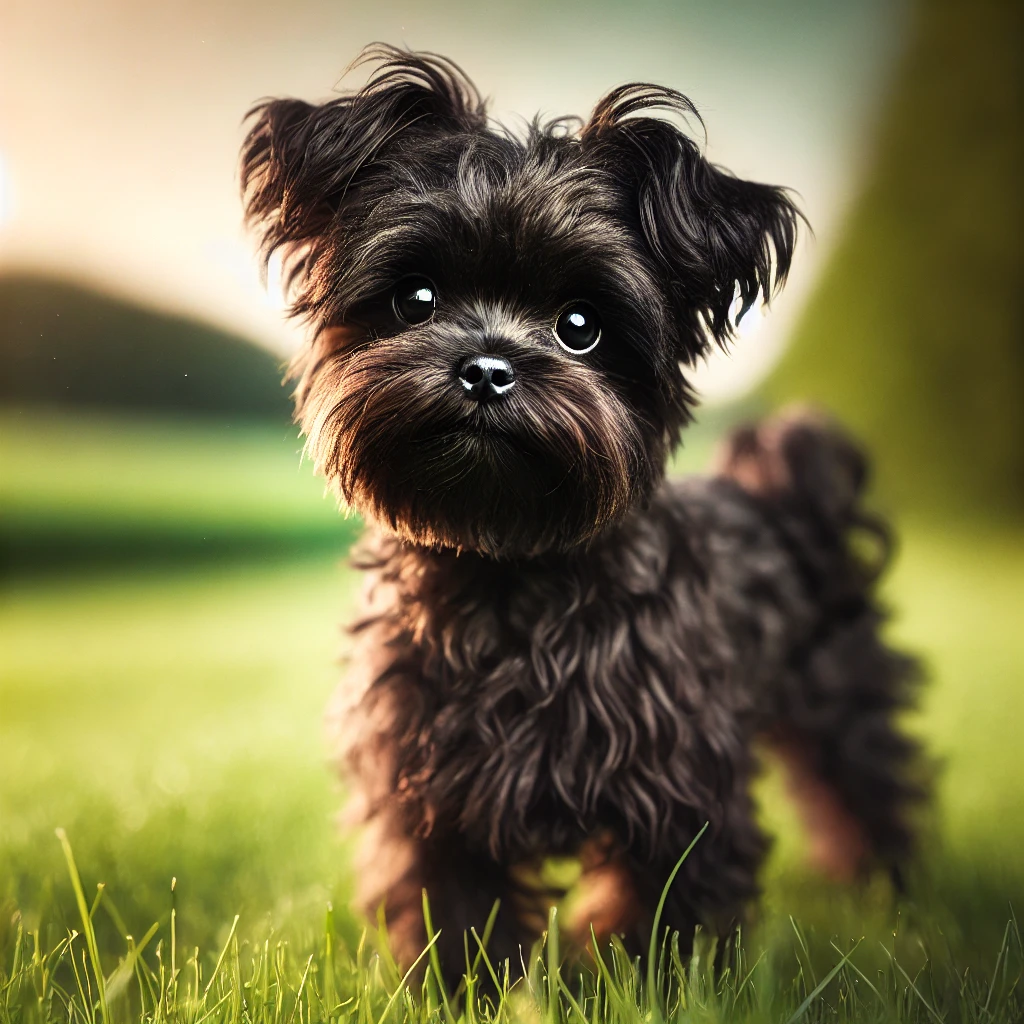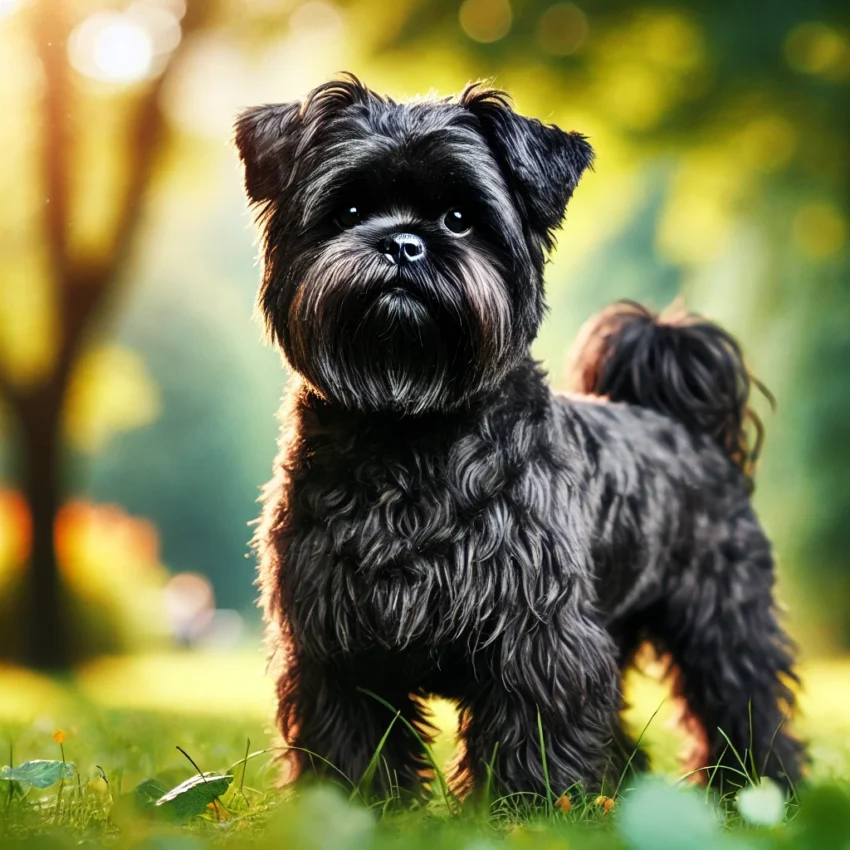The Affenpinscher: A Comprehensive Guide for Dog Lovers

Dogs bring immense joy and companionship to our lives, and choosing the right breed for your home is crucial. One breed that stands out due to its unique looks and feisty personality is the Affenpinscher. If you’re considering adopting an Affenpinscher or are simply curious about this charming toy breed, this guide covers everything you need to know.
Size
The Affenpinscher is a small breed, typically standing between 9 to 11.5 inches in height and weighing around 7 to 10 pounds. Despite their tiny stature, they have a sturdy and well-proportioned body.
Coat
The Affenpinscher has a thick, rough coat that is dense and somewhat shaggy. Their fur gives them a distinct, monkey-like appearance, which is part of their charm. Their coat comes in various colors, including black, gray, silver, and tan, with black being the most common.
Personality
Affenpinschers are known for their bold and confident nature. They are affectionate with their family and have a playful, sometimes mischievous, temperament. Despite their small size, they are fearless and will stand their ground when faced with a challenge.
Training
Training an Affenpinscher can be both fun and challenging. They are intelligent but also independent, which can make them a little stubborn. Positive reinforcement methods work best, and early socialization is crucial to prevent excessive barking and territorial behavior.
Exercise
Although small, Affenpinschers are energetic and require daily exercise. Short walks, interactive playtime, and mental stimulation through toys and puzzles help keep them happy and healthy.
Health
Affenpinschers are generally healthy but are prone to certain genetic conditions, such as patellar luxation, hip dysplasia, heart problems, and eye disorders. Regular vet check-ups and a well-balanced diet contribute to their overall well-being.
Longevity
The average lifespan of an Affenpinscher is between 12 to 15 years. With proper care, some can even exceed this age, living long and happy lives.
Recognition
The Affenpinscher is officially recognized by major kennel clubs, including the American Kennel Club (AKC), the United Kennel Club (UKC), and the Fédération Cynologique Internationale (FCI). It is classified in the Toy Group due to its small size and companion dog nature.
Suitability
Affenpinschers are well-suited for individuals or families who have the time and patience to train and care for them. They do well in apartments and homes with limited space, provided they get enough exercise.
Grooming
Their rough coat requires regular brushing to prevent matting and tangling. A thorough brushing at least two to three times a week and professional grooming every few months will keep their coat in top condition. Trimming around the face and eyes is necessary to maintain their characteristic expression.
Intelligence
Affenpinschers are intelligent dogs with a curious and alert mind. They learn quickly but can have a stubborn streak, making training both rewarding and challenging.
Adaptability
They adapt well to various living environments, including apartments and houses. However, they do not tolerate extreme heat well and should be kept indoors in hot climates with proper cooling.
Activity Level
While they are energetic, they do not require extensive exercise. Short daily walks and active play sessions indoors or in a secure yard will suffice.
Socialization
Affenpinschers are naturally protective and can be wary of strangers. Early socialization helps them become well-mannered and comfortable around new people and pets.
Popularity
Though not as popular as other toy breeds like the Chihuahua or Pomeranian, the Affenpinscher has a devoted following. Their unique appearance and lively personality make them an appealing choice for dog lovers who enjoy small but spirited companions.
History
The Affenpinscher originates from Germany and dates back to the 17th century. Initially bred as a rat-catching dog, they later became beloved companion dogs in Europe. Their name translates to “monkey dog” due to their facial expressions and playful demeanor.
Feeding
A balanced diet is essential for an Affenpinscher’s health. High-quality dry or wet dog food, supplemented with fresh vegetables and lean proteins, will keep them healthy. Portion control is important to prevent obesity.
Weather Conditions
Affenpinschers are not well-suited for extreme temperatures. In cold weather, they need a warm sweater when going outside, and in hot weather, they should be kept cool with shade and plenty of water.
Some FAQs
1. Are Affenpinschers good family dogs? Yes, they make affectionate pets, but they are best suited for families with older children who understand how to handle small dogs.
2. Do Affenpinschers bark a lot? They can be vocal, especially if they sense a threat, but proper training can help manage excessive barking.
3. Are Affenpinschers hypoallergenic? They are considered a low-shedding breed, but no dog is completely hypoallergenic. Regular grooming helps reduce allergens.
4. Can Affenpinschers be left alone? They do not tolerate being left alone for long periods and may develop separation anxiety if not trained properly.
5. Do Affenpinschers get along with other pets? They can coexist with other pets, but their bold nature means they may try to dominate larger animals. Early socialization is key.
Conclusion
The Affenpinscher is a delightful and charming breed that brings a lot of personality into a small package. With the right training, care, and socialization, they make excellent companions for dog lovers looking for an affectionate, intelligent, and playful pet. Whether you live in an apartment or a house, this breed’s adaptability and lovable nature make them a fantastic addition to the right home.


